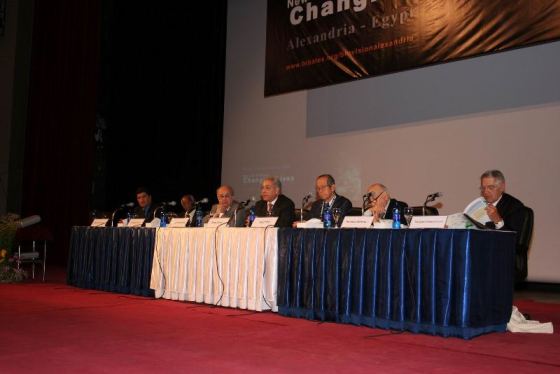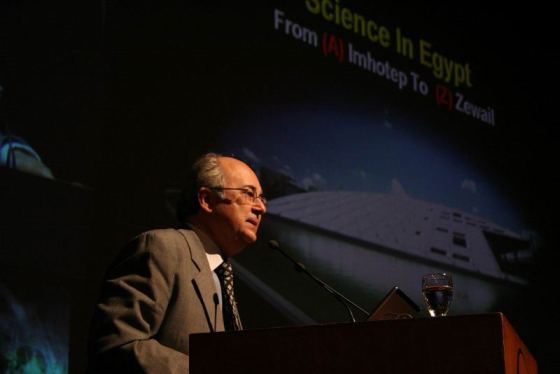The first day of the BioVisionAlexandria 2006 (26 April, 2006)
Posted on
Alexandria -
The BioVisionAlexandria2006: New Life Sciences: Changing Lives was inaugurated by Dr. Ismail Serageldin and a group of distinguished scholars and scientists including Dr. Hany Helal, Minister of Higher Education ( Egypt), Dr. Philippe Desmarescaux, Chairman, The World Life Sciences Forum, BioVision (France), Mr. Koji Omi, Former Japanese Minister of State for Science and Technology Policy ( Japan), Mr. Elias Zerhouni, Director, National Institutes of Health ( USA), Dr. Ibrahim Badran, Former Minister of Health ( Egypt), and Dr. Mohamed Hassan , Executive Director TWAS ( Italy).
The opening session started with an address by Dr. Desmarescaux who stressed the fact that life sciences is one of the main concerns of the 21st century. Life sciences contribute to agriculture, raw material extraction, land reclamation and others. He added that the world should pay special attention to life sciences for a more efficient and credible life.
Mr. Koji Omi then explained Japan’s strategy in promoting life sciences as a means of achieving sustainable development and world peace through a five year plan. He mentioned that Japan already realized the first stage of the plan and is now working on the second.
On scientific globalization, Mr. Elias Zerhouni stated that this conferences serves as a panel for scientific dialogue on the benefits of scientific globalization that links the whole worlds in mere seconds through communication and technology.
Dr. Hany Helal focused on the role of the Egyptian government in supporting and developing scientific research and new life sciences referring to BioVisionAlexandria2006 as an opportunity to discuss different issues in humanities and sciences.
Dr. Ibrahim Badran mentioned the importance of the use of life sciences in maintaining peace through preserving life and paying special attention to the new generations as well as food and health issues.
The Third World Academy of Science was represented by Dr. Mohamed Hassan who stated that the conference hosted by the BA reflects the need of the North and South to build bridges of scientific dialogue on life sciences to combat poverty, hunger, and diseases.
The session also included a recorded lecture by H.E. Potocnik, Janez the European Commissioner for Science and Research, European Commission, from Belgium, who was unable to attend the conference in person.
The closing session was concluded by an interesting lecture by Dr. Seargeldin entitled History of Science in Egypt: From (A) Imphotep to (Z) Zewail. In his lecture, Dr. Serageldin mentioned that Egypt is one of the most ancient civilizations of the world, where sciences, such as medicine, mummification, astronomy, and mathematics developed remarkably. Dr. Serageldin gave examples with accurate numbers on the ancient Egyptians interest in science. He also displayed some digital photos of ancient papyri showing mathematical equations and theories in addition to others on surgery, heart and psychological diseases such as depression, gynecological diseases, and methods of treatment.
Dr. Serageldin moved to the history of Alexandria, Ptolemy I, and the ancient Library of Alexandria. He also mentioned the names of some scientist who flourished in the nineteenth century. On the scientific history of Egypt in the nineteenth and twentieth centuries, Dr. Serageldin referred to Napoleon Bonaparte invasion to Egypt and the delegation of 150 French scientists who wrote the Description of Egypt and founded the Egyptian Scientific Institute. Dr. Serageldin also shed light on the great Egyptian scholars: Farouk Al Baz, Dr. Magdi Yacoub, and Dr. Ahmed Zewail.




Click here to go the Biovision2006 Website
Click here for the program in PDF (N.B. the program is Liable to change)